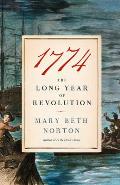The George Washington Book Prize Titles for 2021
Washington College, the Gilder Lehrman Institute of American History, and George Washington’s Mount Vernon have just awarded the 2021 George Washington Book Prize to Mary Beth Norton’s 1774: The Long Year of Revolution.
The prize’s announcement says:
The George Washington Book Prize highlights books about “Washington and his times,” defined as about 1760 to 1820. This year the nominees are even more varied in their topics than usual.
Mark Boonshoft’s Aristocratic Education and the Making of the American Republic discusses the rise of academies between the American Revolution and the Civil War. They were a hybrid between a public and private system of education, receiving significant public funds but largely benefitting the wealthy.
Tacky’s Revolt: The Story of an Atlantic Slave War by Vincent Brown examines the largest slave revolt in British America, which took place on Jamaica in 1760. It was one of the major battles of the Seven Years’ War and remained a nightmare for slaveholders for decades, yet its significance was silenced over time.
Peter Cozzens’s Tecumseh and the Prophet: The Shawnee Brothers Who Defied a Nation discusses the “symbiotic relationship” between Tecumseh and his younger brother Tenskwatawa. In conceiving of what Cozzens describes as the “greatest pan-Indian confederation the westering American Republic would ever confront,” the two men became “among the most influential siblings in the annals of America.”
The Age of Phillis by Honorée Fanonne Jeffers is a work of poetry that also functions as a historical narrative based on years of archival research. While showing the issues that Phillis Wheatley Peters confronted, Jeffers prompts readers to think about the artists who may be in our midst in contemporary American society.
In The President Who Would Not Be King: Executive Power under the Constitution, Michael W. McConnell explores the creation of the presidency in the Constitutional Convention. It shows how many of the prerogative powers of the British monarch were transferred to the Congress instead of the President.
William G. Thomas III’s A Question of Freedom: The Families Who Challenged Slavery from the Nation’s Founding to the Civil War combines the author’s family history with archival research on the “freedom suits” in Maryland that put the institution of slavery itself on trial in U.S. courts.
The prize’s announcement says:
Mary Beth Norton has identified and richly described a key year in the revolutionary transformation of American resistance to Britain. She notes how the courts, the newspapers, the militia, and the assemblies were radicalized against the British.The Road to Concord presents a similar argument on a smaller scale, with the Massachusetts Government Act and Gen. Thomas Gage’s gunpowder seizure on 1 Sept 1774 leading the New England populace to move toward military preparation and outright defiance of royal authority.
She significantly demonstrates that other colonies were more outspoken in their opposition to the tea duties, such as New York and Pennsylvania, than Massachusetts before the Boston Tea Party. She shows that Britain’s Coercive Acts galvanized opposition and contributed to its revolutionary transformation. Her book offers a particularly rich tapestry in recreating the inter-colonial communications and parallel developments between the colonies.
1774 was the first year in which Americans sympathetic to the British be described as Loyalists and Tories, and to be persecuted by the patriots, setting the stage for a civil war that was part of the Revolutionary War. She makes the case that it was the year in which the Revolution became inevitable.
The George Washington Book Prize highlights books about “Washington and his times,” defined as about 1760 to 1820. This year the nominees are even more varied in their topics than usual.
Mark Boonshoft’s Aristocratic Education and the Making of the American Republic discusses the rise of academies between the American Revolution and the Civil War. They were a hybrid between a public and private system of education, receiving significant public funds but largely benefitting the wealthy.
Tacky’s Revolt: The Story of an Atlantic Slave War by Vincent Brown examines the largest slave revolt in British America, which took place on Jamaica in 1760. It was one of the major battles of the Seven Years’ War and remained a nightmare for slaveholders for decades, yet its significance was silenced over time.
Peter Cozzens’s Tecumseh and the Prophet: The Shawnee Brothers Who Defied a Nation discusses the “symbiotic relationship” between Tecumseh and his younger brother Tenskwatawa. In conceiving of what Cozzens describes as the “greatest pan-Indian confederation the westering American Republic would ever confront,” the two men became “among the most influential siblings in the annals of America.”
The Age of Phillis by Honorée Fanonne Jeffers is a work of poetry that also functions as a historical narrative based on years of archival research. While showing the issues that Phillis Wheatley Peters confronted, Jeffers prompts readers to think about the artists who may be in our midst in contemporary American society.
In The President Who Would Not Be King: Executive Power under the Constitution, Michael W. McConnell explores the creation of the presidency in the Constitutional Convention. It shows how many of the prerogative powers of the British monarch were transferred to the Congress instead of the President.
William G. Thomas III’s A Question of Freedom: The Families Who Challenged Slavery from the Nation’s Founding to the Civil War combines the author’s family history with archival research on the “freedom suits” in Maryland that put the institution of slavery itself on trial in U.S. courts.


No comments:
Post a Comment